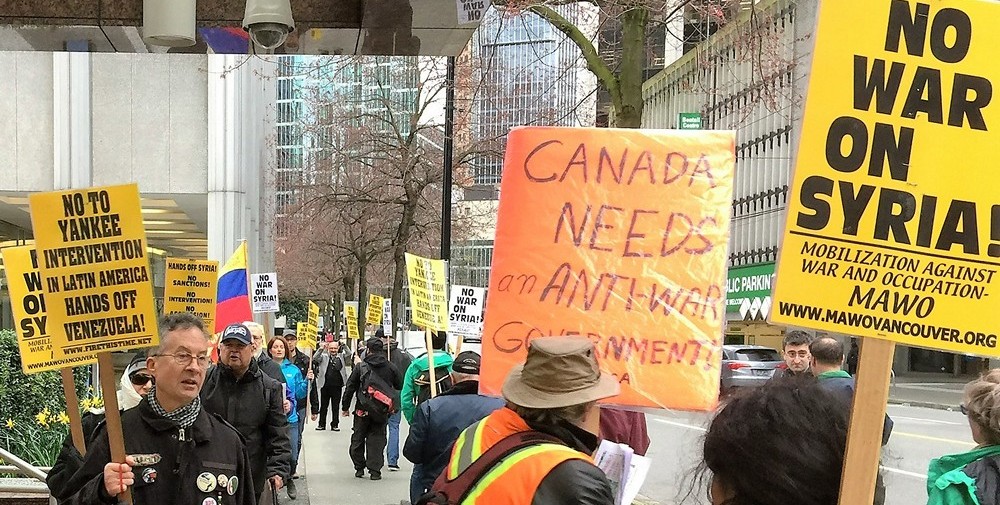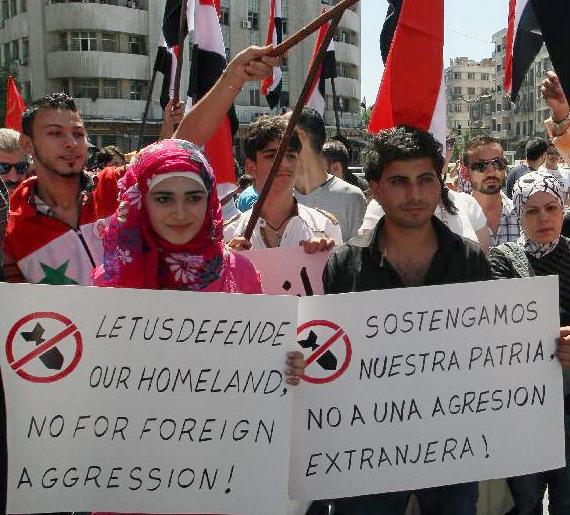
|
April 8, 2017 - No. 12 Join Demonstrations Against U.S. Attack on Syria Oppose U.S. Air
Strikes Against Syria!
• Make Canada
a Zone for Peace! Join Demonstrations Against U.S. Attack on Syria Oppose U.S. Air Strikes Against Syria!
|
|
|
U.S. aggression against Syria is "an irresponsible and short-sighted action that holds no military or political prospects," the Syrian presidential office said in a statement circulated by the news agency SANA the day following the U.S. air strikes.
The missile strike pursues a goal of rendering support to the accomplices of the U.S. from among terrorist groups active in Syria, the statement reads. "The Syrian Arab Republic states in response that this aggression will only strengthen Syrians' resolve to crush mercenaries' gangs and will accelerate the pace of military operations against them," it adds.
For its part, the Syrian People's Assembly condemned the U.S. aggression in the strongest terms, SANA reports.
"This blatant aggression came in defence of the collapsed terrorist organizations and in an attempt to revive them since Israel failed to carry out this mission before," the Assembly said in a statement. It added that the United States, the sponsor of terrorism in the world, began to practice terrorism against Syria after its terrorist tools failed to achieve any progress against the Syrian Arab Army.
"This new U.S. aggression, added to the aggression on the army units in Deir Ezzor and the bombing of the Euphrates Dam faciliities, reveals again the falsity of the U.S. allegations of combating ISIS terrorist organization," the statement said. It also extended greetings to the steadfast Syrian people and wished a speedy recovery to the wounded, SANA says.
The Syrian Arab Army will not be deterred by this brutal aggression from defeating terrorism and its supporters and clearing the entire Syrian soil of terrorism, the Legislative Assembly said in conclusion.
Russian President and Officials
Russian officials on April 7 condemned the U.S. strike
against a Syrian airfield as an "act of aggression." In addition,
Russia called off its use of a shared military communications channel
that had been used to prevent possible midair collisions between U.S.
and Russian pilots, TASS reports. Called the deconfliction line, it was
established in October 2015 after several close calls between U.S. and
Russian air forces in Syrian skies. It is now suspended as of April 8.
Russian President Vladimir Putin accused the U.S. of using a "far-fetched pretext" to attack Syria following this week's chemical weapons strike, the news agency TASS reported.
 "Washington's move deals a
significant blow to the
Russia-U.S. relations, which are already in a deplorable shape,"
a Putin spokesperson said.
"Washington's move deals a
significant blow to the
Russia-U.S. relations, which are already in a deplorable shape,"
a Putin spokesperson said.
Asked at a news conference whether the U.S. attack was viewed by the Kremlin as an act of aggression against Russia's ally, the President's press secretary Dmitry Peskov said "Definitely.... Since we are rendering assistance to the Syrian military in line with the relevant request from the Syrian authorities, we view Syria as our ally."
"As for the changes in the geopolitical situation after these attacks, let's watch the situation develop together. So far, one can definitively say that the strikes impaired the fight against terrorism," Peskov said.
"What is unambiguous is the fact that the strikes [by the U.S. on Syria] de facto were delivered in the interests of the ISIL [the former name of the Islamic State terrorist organization outlawed in Russia], Jabhat al-Nusra and other terrorist organizations," he said.
Regarding exchanges of information via military channels about its operations in Syria, Peskov confirmed that Russia has suspended the Memorandum on preventing military incidents and ensuring aviation security that was signed with the U.S.
"Technically the channels remain, but no information will be exchanged," Peskov said. "This Memorandum lost its meaning last night when the attack was carried out," he added.
Viktor Ozerov, the chairman of the Defence Committee in the Federation Council, condemned the cruise missile strikes at the Shayrat airfield, stating that the operation could endanger any further joint military operations.
"This could eliminate the ongoing cooperation between Russian and U.S. forces in Syria," Ozerov said, as reported by RIA news.
 He further stressed that
the operation may destroy
joint
anti-terrorism efforts in the country.
He further stressed that
the operation may destroy
joint
anti-terrorism efforts in the country.
"The U.S. rocket strike could tank the effort to combat terrorism in Syria," Ozerov said.
Another member of the Federation Council, Konstantin Kosachev, echoed Ozerov's remarks, stressing that future cooperation with Russia in Syria is now unlikely.
"Either way, Russian missiles continue to target terrorists while the American rockets hit government forces that spearhead the effort against terrorists," Kosachev said. "I am afraid that with such an approach the desired Russo-American anti-terrorist coalition in Syria -- that has so frequently been discussed since [President] Trump came to power -- will not come to fruition," he added.
As well, the Director of the Russian Foreign Ministry's Department for Non-Proliferation and Arms Control Mikhail Ulyanov told TASS on April 7 that claims of chemical weapons being present at the Shayrat Airfield hit by U.S. strikes are groundless. "This is a clumsy attempt at least somehow to justify the actions running counter to the fundamental norms of international law," he said.
Positions on April 4 Use of Chemical Weapons in Syria
Deputy Prime Minister of Syria Says Army
Did Not and Will Not
Use Chemical Weapons
Even Against Terrorists
Walid al-Moallem, Syria’s Deputy Prime Minister, Foreign and Expatriates Minister, reaffirmed at an April 6 press conference in Damascus that the Syrian Arab Army did not and will not use any kind of chemical weapons even against the terrorists who target the Syrian people.
Al-Moallem pointed out that this lie about the Syrian army came from countries known for conspiring against Syria, whether through support for terrorists or other attempts to disrupt the political process.
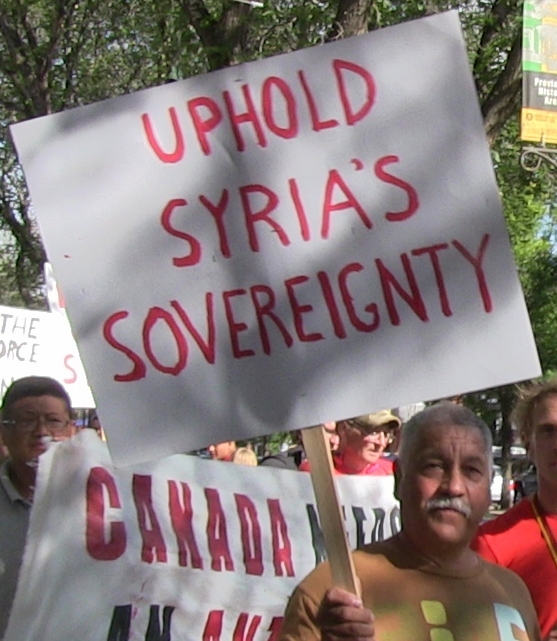 "All of you learned about
the statement of the Command of the Army and the Armed Forces and the
statement of the Foreign and Expatriates Ministry that was sent to the
UN Security
Council and sent to the Organization for the Prohibition of
Chemical Weapons (OPCW) and the statement of Deputy Permanent
Representative in New York, and all of these statements
stressed that our forces could not have used chemical weapons --
neither in the past nor in the present, and neither could they use them
in the future in any place, and that we condemn such
criminal acts," al-Moallem said.
"All of you learned about
the statement of the Command of the Army and the Armed Forces and the
statement of the Foreign and Expatriates Ministry that was sent to the
UN Security
Council and sent to the Organization for the Prohibition of
Chemical Weapons (OPCW) and the statement of Deputy Permanent
Representative in New York, and all of these statements
stressed that our forces could not have used chemical weapons --
neither in the past nor in the present, and neither could they use them
in the future in any place, and that we condemn such
criminal acts," al-Moallem said.
Al-Moallem reminded the press conference that Syria had already joined the OPCW and submitted successive reports, with the OPCW confirming the accuracy of the Syrian data in mid-2016.
He questioned the timing of the smear campaign against Syria. He pointed to favourable developments in recent weeks, including the active movement toward national reconciliation, the interdiction of terrorist attacks in Jobar and the northern countryside of Hama by the Syrian Army, and the absence of terrorist groups at the latest peace talks in Astana, Kazakhstan, whose presence would have blocked the proceedings.
He also referred to the fifth round of talks in Geneva, where the "Riyadh delegation" of opposition groups had only one demand, which is to take power.
"When all these attempts failed, they came up with the lie of the army's use of chemical weapons in Khan Sheikhoun," said al-Moallem.
The Foreign Minister explained that the campaign of accusing the Syrian army of using chemical weapons in Khan Sheikhoun started at 06:00 am on April 4, while the first air raid carried out by the Syrian army only took place at 11:30 am, targeting an ammunition store of Jabhat al-Nusra terrorists that it subsequently became known included chemical weapons.
He went on to clarify that the evidence that the target was an ammunition depot is that the affected area shown in video footage from the "White Helmets" and the London-based "Syrian Observatory for Human Rights" was relatively small, and that had this been an airstrike that used chemical weapons, the affected area would have had a radius of more than half a kilometre.
He stressed that ISIS, Jabhat al-Nusra and other terrorist groups have continued to store chemical weapons in cities and inhabited areas, pointing out that Syria has sent more than 100 cables to the UN Security Council and the OPCW. These included information on the entry of chemical materials from Iraq to ISIS and Jabhat al-Nusra and from the Turkish border towards Idleb.
"This chorus that was launched in the international arena is made up of states that are well-known for conspiring against Syria," said al-Moallem.
"I reiterate that the Syrian Arab Army has never used and will never use this type of weapon, not only not against our people and our children, but not even against the terrorists who are killing our people and our children and attacking civilians in the cities with their random shells," al-Moallem added.
He stressed that it is not reasonable that the Syrian army would use chemical weapons at a time when it has been achieving victories on various fronts that have led to changes in the positions of some countries in the international arena and "at this time when we are optimistic about the world public opinion's realization of the reality of the terrorist plot against Syria"
"And we are aware that the main beneficiary of all that is happening is Israel, and it is strange to see Netanyahu almost weeping for what happened in Khan Sheikhoun," al-Moallem said.
 He commented on a statement
to the Security Council made by U.S. Ambassador to the UN Nikki Haley
on April 5 in which she said the U.S. does not have information on
what
happened in Khan Sheikhoun, but nonetheless the U.S. points its finger
at Syria.
He commented on a statement
to the Security Council made by U.S. Ambassador to the UN Nikki Haley
on April 5 in which she said the U.S. does not have information on
what
happened in Khan Sheikhoun, but nonetheless the U.S. points its finger
at Syria.
Al-Moallem said it is normal that they do not have information since the chorus of accusations directed at the Syrian army started only an hour after what happened in Khan Sheikhoun became public. He wondered how could the U.S. not have information about what happened, while UN Envoy for Syria Staffan de Mistura had that information and said that the chemical weapons came from the air, but that he forgot to name the pilot.
Answering a question about whether Syria would welcome an international committee of inquiry into the use of chemical weapons in Khan Seikhoun, al-Moallem said that on April 5, the Russian representative to the Security Council submitted ideas on forming a neutral and non-politicized committee with broad representation to probe the incident. He added that Syria's experience with such committees that have come to Damascus is not encouraging as they typically leave Damascus with one set of data but present another when they return home.
He pointed out that Syria constantly coordinates with the Russian side on this matter.
In response to a question on whether the aim of this campaign against Syria was to foil the political process, the Minister said this depends on the developments during the coming few days at the UNSC and through the Russian-U.S. communications, noting that "Syria is keen to make the political dialogue a success, but if their goal is to disable it, then let it be."
Al-Moallem noted that a new terrorist assault was launched on April 6 in the northern countryside of Lattakia as part of the continued attempts by backers of the terrorist organizations to disrupt the political process after their recent failed attacks in the Jobar and Hama countryside.
The Foreign Minister cited other goals that could be behind this campaign against Syria, including to cause U.S. President Donald Trump to change his recent opinion on Syria, which al-Moallem said may have been achieved to a slight degree, or to pressure the Russian side that provides real and sincere support to Syria in its struggle against terrorism. The latter is unlikely to be achieved especially after the two statements issued by the Kremlin on continued support to Syria's army and legitimate government. Likewise, another possible aim, to pressure Damascus to change its stances and principles, will be difficult to achieve.
Asked about the announcement by Turkish President Recep Tayyip Erdogan on preparing for a new operation to invade Syria after the conclusion of the so-called "Euphrates Shield" operation, al-Moallem said Erdogan had declared on April 5 that his next target is Manbij, adding that the Syria government will "let him go ahead and we will see what he will do."
Responding to a question on whether Syria would accept
a committee of inquiry convened by the UN, al-Moallem said:
"We have to ensure that this committee is not
politicized, has wide geographical representation and that it starts
from Damascus and not from Turkey. We have many questions on this
subject and when we have made sure that these questions have convincing
answers, then we will give you our answer."
(Syrian Arab News Agency)
Information Provided by Russian Defence Ministry
On April 5, spokesperson for the Russian Defence Ministry addressed an April 4 Syrian aviation airstrike on the eastern outskirts of Khan Sheikhun, the news agency TASS reported.
"According to Russian airspace monitoring systems, yesterday between 11:30 and 12:30 local time the Syrian aviation carried out an airstrike on the eastern outskirts of Khan Sheikhun, targeting a major ammunition storage facility of terrorists and a cluster of military hardware. The territory of this storage facility housed workshops to produce projectiles stuffed with toxic agents," Maj. Gen. Igor Konashenkov said.
"From this major arsenal, chemical-laden weapons were delivered by militants to Iraq. Their use by terrorists was confirmed on numerous occasions by international organizations and official authorities of the country," he said.
The spokesman added that these projectiles were similar to those used by militants in Syria's Aleppo, where their use was recorded by Russian military specialists.
"Video footage from social networks shows that those affected in Khan Sheikhun demonstrate the same symptoms of poisoning as the victims of the Aleppo attack had last fall," he added.
The official said that Russia has handed over all information about the incident to the Organization for the Prohibition of Chemical Weapons (OPCW), which is still studying them.
"We assure that this information is completely unbiased and true," he added.
What the U.S. Said at April 5
UN Security Council Meeting
Posted below is an excerpt from the remarks of Nikki Haley, U.S. Permanent Representative to the United Nations said at the April 5 Emergency UN Security Council Meeting on Chemical Weapons.[1]
***
[...]
Yesterday morning, we awoke to pictures, to children foaming at the mouth, suffering convulsions, being carried in the arms of desperate parents. We saw rows of lifeless bodies. Some still in diapers. Some with the visible scars of a chemical weapons attack.
 Look at those pictures. We
cannot close our eyes to
those
pictures. We cannot close our minds of the responsibility to act.
We don't yet know everything about yesterday's attack. But there
are many things we do know.
Look at those pictures. We
cannot close our eyes to
those
pictures. We cannot close our minds of the responsibility to act.
We don't yet know everything about yesterday's attack. But there
are many things we do know.
We know that yesterday's attack bears all the hallmarks of the Assad regime's use of chemical weapons. We know that Assad has used these weapons against the Syrian people before. That was confirmed by this Council's own independent team of investigators. We know that yesterday's attack was a new low, even for the barbaric Assad regime.
Evidence reported from the scene indicates that Assad is now using even more lethal chemical agents than he did before. The gas that fell out of the sky yesterday was more deadly, leaving men, women, the elderly, and children, gasping for their very last breath.
And as first responders, doctors, and nurses rushed to help the victims, a second round of bombs rained down. They died in the same slow, horrendous manner as the civilians they were trying to save.
"We all also know this: Just a few weeks ago, this Council attempted to hold Assad accountable for suffocating his own people to death with toxic chemicals. Russia stood in the way of this accountability. They made an unconscionable choice. They chose to close their eyes to the barbarity. They defied the conscience of the world. Russia cannot escape responsibility for this. In fact, if Russia had been fulfilling its responsibility, there would not even be any chemical weapons left for the Syrian regime to use.
There is one more thing we know: We know that if nothing is done, these attacks will continue.
Assad has no incentive to stop using chemical weapons as long as Russia continues to protect his regime from consequences. I implore my colleagues to take a hard look at their words in this Council. We regularly repeat tired talking points in support of a peace process that is regularly undermined by the Assad regime.
 Time and time again, Russia
uses the same false
narrative to
deflect attention from their allies in Damascus. Time and time
again, without any factual basis, Russia attempts to place blame
on others.
Time and time again, Russia
uses the same false
narrative to
deflect attention from their allies in Damascus. Time and time
again, without any factual basis, Russia attempts to place blame
on others.
There is an obvious truth here that must be spoken. The truth is that Assad, Russia, and Iran have no interest in peace.
The illegitimate Syrian government, led by a man with no conscience, has committed untold atrocities against his people for more than six years. Assad has made it clear that he doesn't want to take part in a meaningful political process. Iran has reinforced Assad's military, and Russia has shielded Assad from UN sanctions.
If Russia has the influence in Syria that it claims to have, we need to see them use it. We need to see them put an end to these horrific acts. How many more children have to die before Russia cares?
The United States sees yesterday's attack as a disgrace at the highest level, an assurance that humanity means nothing to the Syrian government.
The question members of this Council must ask themselves is this: If we are not able to enforce resolutions preventing the use of chemical weapons, what does that say for our chances of ending the broader conflict in Syria? What does that say of our ability to bring relief to the Syrian people? If we are not able to enforce resolutions preventing the use of chemical weapons, what does that say about our effectiveness in this institution?
If we are not prepared to act, then this Council will keep meeting, month after month, to express outrage at the continuing use of chemical weapons, and it will not end. We will see more conflict in Syria. We will see more pictures that we can never un-see.
I began my remarks by saying that in the life of the United Nations, there are times when we are compelled to take collective action. I will now add this: When the United Nations consistently fails in its duty to act collectively, there are times in the life of states that we are compelled to take our own action.
For the sake of the victims, I hope the rest of the
Council
is finally willing to do the same. The world needs to see the use
of chemical weapons and the fact that they will not be
tolerated.
Note
1. For the month of April, the
United States is serving as President of the United Nations
Security Council, a position that rotates every month among the 15
Security Council
members. The U.S. will be responsible for setting the agenda for the
month, organizing
meetings, managing the distribution of information to Council members,
issuing statements,
and communicating the Council's actions to the public.
Commentaries
Another Dangerous Rush to Judgment in Syria
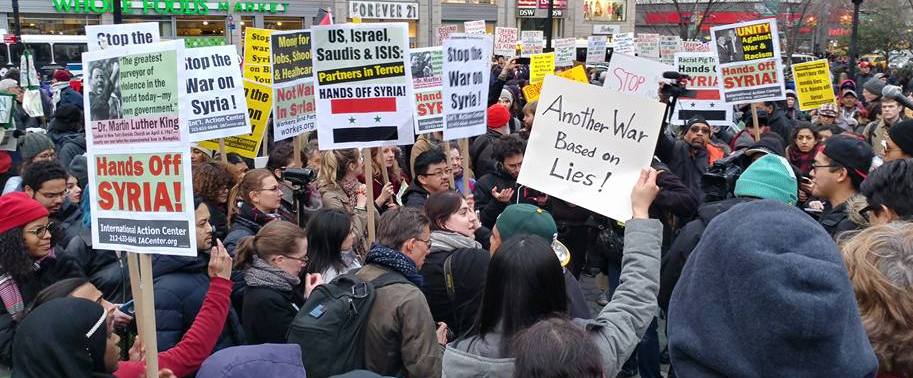
Rally in Union Square, New York City, April 7, 2017.
With the latest hasty judgment about Tuesday's [April 4] poison-gas deaths in a rebel-held area of northern Syria, the mainstream U.S. news media once more reveals itself to be a threat to responsible journalism and to the future of humanity. Again, we see the troubling pattern of verdict first, investigation later, even when that behavior can lead to a dangerous war escalation and many more deaths.
Before a careful evaluation of the evidence about Tuesday's tragedy was possible, The New York Times and other major U.S. news outlets had pinned the blame for the scores of dead on the Syrian government of Bashar al-Assad. That revived demands that the U.S. and other nations establish a "no-fly zone" over Syria, which would amount to launching another "regime change" war and would put America into a likely hot war with nuclear-armed Russia.
Even as basic facts were still being assembled about Tuesday's incident, we, the public, were prepped to disbelieve the Syrian government's response that the poison gas may have come from rebel stockpiles that could have been released either accidentally or intentionally causing the civilian deaths in a town in Idlib Province.
One possible scenario was that Syrian warplanes bombed a rebel weapons depot where the poison gas was stored, causing the containers to rupture. Another possibility was a staged event by increasingly desperate Al Qaeda jihadists who are known for their disregard for innocent human life.
While it's hard to know at this early stage what's true and what's not, these alternative explanations, I'm told, are being seriously examined by U.S. intelligence. One source cited the possibility that Turkey had supplied the rebels with the poison gas (the exact type still not determined) for potential use against Kurdish forces operating in northern Syria near the Turkish border or for a terror attack in a government-controlled city like the capital of Damascus.
Reporting by investigative journalist Seymour Hersh and statements by some Turkish police and opposition politicians linked Turkish intelligence and Al Qaeda-affiliated jihadists to the Aug. 21, 2013 sarin gas attack outside Damascus that killed hundreds, although the Times and other major U.S. news outlets continue to blame that incident on Assad's regime.
Seasoned Propagandists
On Tuesday, the Times assigned two of its most committed anti-Syrian-government propagandists to cover the Syrian poison-gas story, Michael B. Gordon and Anne Barnard.
Gordon has been at the front lines of the neocon "regime change" strategies for years. He co-authored the Times' infamous aluminum tube story of Sept. 8, 2002, which relied on U.S. government sources and Iraqi defectors to frighten Americans with images of "mushroom clouds" if they didn't support President George W. Bush's upcoming invasion of Iraq. The timing played perfectly into the administration's advertising "rollout" for the Iraq War.
Of course, the story turned out to be false and to have unfairly downplayed skeptics of the claim that the aluminum tubes were for nuclear centrifuges, when the aluminum tubes actually were meant for artillery. But the article provided a great impetus toward the Iraq War, which ended up killing nearly 4,500 U.S. soldiers and hundreds of thousands of Iraqis.
Gordon's co-author, Judith Miller, became the only U.S. journalist known to have lost a job over the reckless and shoddy reporting that contributed to the Iraq disaster. For his part, Gordon continued serving as a respected Pentagon correspondent.
 Gordon's name also showed up in a
supporting role on
the Times' botched
"vector analysis," which supposedly proved that
the Syrian military was responsible for the Aug. 21, 2013
sarin-gas attack. The "vector analysis" story of Sept. 17, 2013,
traced the flight paths of two rockets, recovered in suburbs of
Damascus back to a Syrian military base 9.5 kilometers away.
Gordon's name also showed up in a
supporting role on
the Times' botched
"vector analysis," which supposedly proved that
the Syrian military was responsible for the Aug. 21, 2013
sarin-gas attack. The "vector analysis" story of Sept. 17, 2013,
traced the flight paths of two rockets, recovered in suburbs of
Damascus back to a Syrian military base 9.5 kilometers away.
The article became the "slam-dunk" evidence that the Syrian government was lying when it denied launching the sarin attack. However, like the aluminum tube story, the Times' "vector analysis" ignored contrary evidence, such as the unreliability of one azimuth from a rocket that landed in Moadamiya because it had struck a building in its descent. That rocket also was found to contain no sarin, so it's inclusion in the vectoring of two sarin-laden rockets made no sense.
But the Times' story ultimately fell apart when rocket scientists analyzed the one sarin-laden rocket that had landed in the Zamalka area and determined that it had a maximum range of about two kilometers, meaning that it could not have originated from the Syrian military base. C.J. Chivers, one of the co-authors of the article, waited until Dec. 28, 2013, to publish a halfhearted semi-retraction.[1]
Gordon was a co-author of another bogus Times' front-page story on April 21, 2014, when the State Department and the Ukrainian government fed the Times two photographs that supposedly proved that a group of Russian soldiers -- first photographed in Russia -- had entered Ukraine, where they were photographed again.
However, two days later, Gordon was forced to pen a retraction because it turned out that both photos had been shot inside Ukraine, destroying the story's premise.[2]
Gordon perhaps personifies better than anyone how mainstream journalism works. If you publish false stories that fit with the Establishment's narratives, your job is safe even if the stories blow up in your face. However, if you go against the grain -- and if someone important raises a question about your story -- you can easily find yourself out on the street even if your story is correct.
No Skepticism Allowed
Anne Barnard, Gordon's co-author on Tuesday's Syrian poison-gas story, has consistently reported on the Syrian conflict as if she were a press agent for the rebels, playing up their anti-government claims even when there's no evidence.
For instance, on June 2, 2015, Barnard, who is based in Beirut, Lebanon, authored a front-page story that pushed the rebels' propaganda theme that the Syrian government was somehow in cahoots with the Islamic State though even the U.S. State Department acknowledged that it had no confirmation of the rebels' claims.
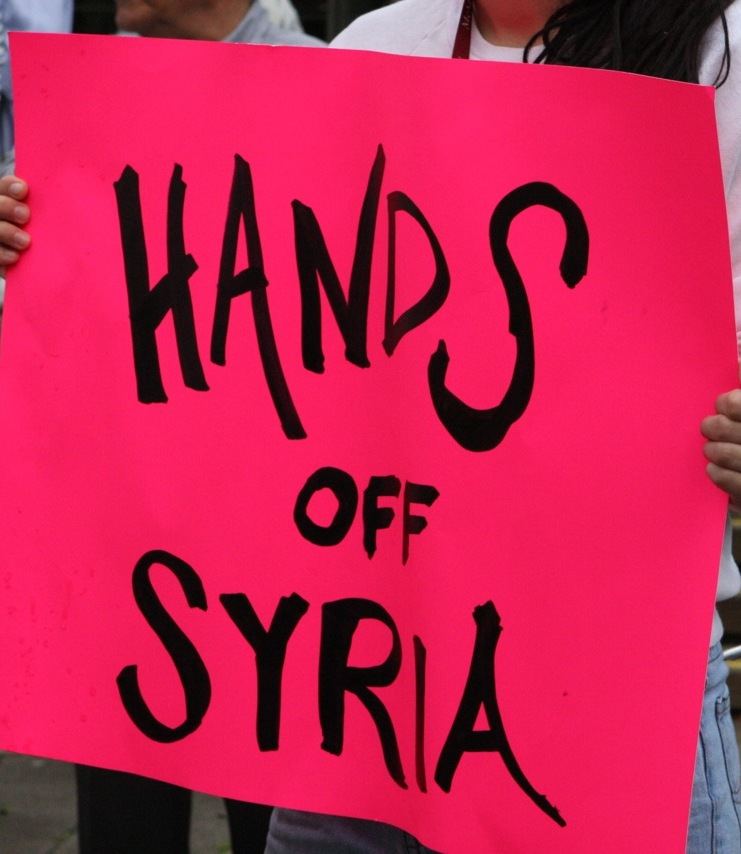 When Gordon and Barnard
teamed up to report on the
latest
Syrian tragedy, they again showed no skepticism about early U.S.
government and Syrian rebel claims that the Syrian military was
responsible for intentionally deploying poison gas.
When Gordon and Barnard
teamed up to report on the
latest
Syrian tragedy, they again showed no skepticism about early U.S.
government and Syrian rebel claims that the Syrian military was
responsible for intentionally deploying poison gas.
Perhaps for the first time, The New York Times cited President Trump as a reliable source because he and his press secretary were saying what the Times wanted to hear -- that Assad must be guilty.
Gordon and Barnard also cited the controversial White Helmets, the rebels' Western-financed civil defense group that has worked in close proximity with Al Qaeda's Nusra Front and has come under suspicion of staging heroic "rescues" but is nevertheless treated as a fount of truth-telling by the mainstream U.S. news media.
In early online versions of the Times' story, a reaction from the Syrian military was buried deep in the article around the 27th paragraph, noting: "The government denies that it has used chemical weapons, arguing that insurgents and Islamic State fighters use toxins to frame the government or that the attacks are staged."
The following paragraph mentioned the possibility that a Syrian bombing raid had struck a rebel warehouse where poison-gas was stored, thus releasing it unintentionally.
But the placement of the response was a clear message that the Times disbelieved whatever the Assad government said. At least in the version of the story that appeared in the morning newspaper, a government statement was moved up to the sixth paragraph although still surrounded by comments meant to signal the Times' acceptance of the rebel version.
After noting the Assad government's denial, Gordon and Barnard added, "But only the Syrian military had the ability and the motive to carry out an aerial attack like the one that struck the rebel-held town of Khan Sheikhoun."
But they again ignored the alternative possibilities. One was that a bombing raid ruptured containers for chemicals that the rebels were planning to use in some future attack, and the other was that Al Qaeda's jihadists staged the incident to elicit precisely the international outrage directed at Assad as has occurred.
Gordon and Barnard also could be wrong about Assad being the only one with a motive to deploy poison gas. Since Assad's forces have gained a decisive upper-hand over the rebels, why would he risk stirring up international outrage at this juncture? On the other hand, the desperate rebels might view the horrific scenes from the chemical-weapons deployment as a last-minute game-changer.
Pressure to Prejudge
None of this means that Assad's forces are innocent, but a serious investigation ascertains the facts and then reaches a conclusion, not the other way around.
However, to suggest these other possibilities will, I suppose, draw the usual accusations about "Assad apologist," but refusing to prejudge an investigation is what journalism is supposed to be about.
The Times, however, apparently has no concern anymore for letting the facts be assembled and then letting them speak for themselves. The Times weighed in on Wednesday with an editorial entitled "A New Level of Depravity From Mr. Assad."
Another problem with the behavior of the Times and the mainstream media is that by jumping to a conclusion they pressure other important people to join in the condemnations and that, in turn, can prejudice the investigation while also generating a dangerous momentum toward war.
Once the political leadership pronounces judgment, it becomes career-threatening for lower-level officials to disagree with those conclusions. We've seen that already with how United Nations investigators accepted rebel claims about the Syrian government's use of chlorine gas, a set of accusations that the Times and other media now report simply as flat-fact.
Yet, the claims about the Syrian military mixing in canisters of chlorine in supposed "barrel bombs" make little sense because chlorine deployed in that fashion is ineffective as a lethal weapon but it has become an important element of the rebels' propaganda campaign.
UN investigators, who were under intense pressure from the United States and Western nations to give them something to use against Assad, did support rebel claims about the government using chlorine in a couple of cases, but the investigators also received testimony from residents in one area who described the staging of a chlorine attack for propaganda purposes.
One might have thought that the evidence of one staged attack would have increased skepticism about the other incidents, but the UN investigators apparently understood what was good for their careers, so they endorsed a couple of other alleged cases despite their inability to conduct a field investigation.[3]
Now, that dubious UN report is being leveraged into
this
new incident, one opportunistic finding used to justify another.
But the pressing question now is: Have the American people come
to understand enough about "psychological operations" and
"strategic communications" that they will finally show the
skepticism that no longer exists in the major U.S. news
media?
Robert Parry is an investigative journalist known for his role in covering the Iran-Contra affair and CIA cocaine trafficking in the U.S. scandal in the 1980s. He was awarded the George Polk Award for National Reporting in 1984 and the I.F. Stone Medal for Journalistic Independence by Harvard's Nieman Foundation in 2015. Parry has edited Consortiumnews.com since 1995.
Notes
1. "NYT
Backs
Off
Its
Syria-Sarin
Analysis,"
Consortiumnews.com,
December
29,
2013.
2. "NYT
Retracts
Russian-Photo
Scoop,"
Consortiumnews.com,
April
23,
2014.
3. "UN
Team
Heard
Claims
of
'Staged'
Chemical
Attacks,"
Consortiumnews.com,
September
8,
2016.
(Consortiumnews.com, April 5, 2017.)
Why Is Media Citing Man Accused of
Kidnapping Journalists as
Credible Source
on Syrian Chemical Attack?
Calls for regime change in Syria are once again filling the airwaves, and President Donald Trump has said he is considering further military intervention in the country.
Media outlets have been pouring fuel on the fire of war. One of the key voices calling for Western intervention that is being amplified by corporate news networks is Shajul Islam, a doctor in the al-Qaeda-controlled Syrian province of Idlib. Islam has accused the Syrian government of carrying out a chemical attack on civilians and dozens of major media outlets have cited his claims, while conceding that they have not been independently verified. Meanwhile, these news publications have failed to disclose a crucial detail about the doctor: He was accused in court of kidnapping journalists in Syria.
In October 2012, Shajul Islam was arrested in the UK and charged with kidnapping two photographers, one British and one Dutch. He was accused of providing medical treatment for the Salafi jihadist extremist group in Syria that held the journalists hostage. The case eventually fell apart and the charges against Islam were dropped because the prosecution was not able to hear evidence from the victims, who were the key witnesses. The attorney said this restriction served "to frustrate the trial from the point of view of the prosecution."
John Cantlie, one of the journalists Islam was accused of kidnapping, was unable to appear at the trial because he was still a hostage. He was kidnapped along with James Foley, the American journalist who was beheaded on camera by Mohamed Emwazi, an ISIS foreign fighter from London.
Islam's younger brother, Razul, reportedly entered Syria to volunteer as a foreign fighter in the ranks of ISIS.
Sometime in 2016, Shajul Islam smuggled himself back into Syria and is now working in Idlib.
Even hawkish pundits who have repeatedly called for further Western military intervention in Syria have acknowledged that Idlib is "the heartland of al-Nusra," in reference to Jabhat al-Nusra, Syria's al-Qaeda affiliate.
Syrian al-Qaeda and other extremist rebel groups have constructed a brutally repressive regime in Idlib. They have ethnically cleansed religious and ethnic minorities, banned music and instituted a violent theocratic system in which women accused of adultery are publicly executed. Amnesty International documented Salafi jihadist groups' use of summary killings, torture, abductions and sectarian violence in the province.
On April 3, an alleged chemical attack in Idlib killed dozens of civilians. The details around the incident are murky.
At a press conference April 4, Staffan de Mistura, the U.N. special envoy for Syria noted, "We have not yet any official or reliable confirmation." Federica Mogherini, high representative of the EU for foreign affairs and security policy, likewise said, "We also do not have evidence at the moment."
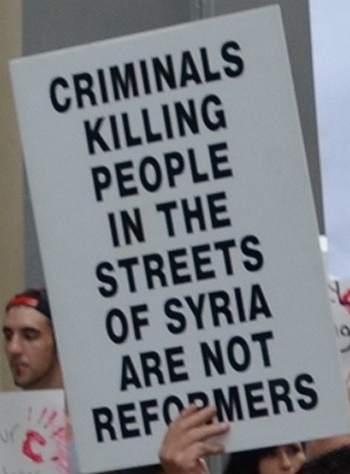 A statement by the the
Organization for the Prohibition
of
Chemical Weapons did not apportion blame and noted it "is in the
process of gathering and analysing information."
A statement by the the
Organization for the Prohibition
of
Chemical Weapons did not apportion blame and noted it "is in the
process of gathering and analysing information."
However, the U.S. government, which has spent billions over the past several years arming and training rebels committed to overthrowing Syrian leader Bashar al-Assad, immediately said the Syrian government had used chemical weapons, an accusation the Syrian and Russian governments deny.
Media outlets were quick to jump on board and echo the U.S. government's claims. Shajul Islam became a key source for the accusation that the Syrian government had used sarin gas against civilians.
Numerous media outlets cited Islam's claims and social media posts, including CBS News, Fox News, McClatchy, the Daily Beast, Voice of America, the New York Daily News, the New York Post, CBC, Politico, the Independent, Vocativ, Bellingcat, Euronews, Middle East Eye, the Mirror, Metro, the Daily Mail, the Sun and UNILAD.
NBC News and Middle East Eye published profiles of Islam without identifying him.
Even right-wing pro-Trump media outlets that have previously opposed U.S.-led regime change in Syria have suddenly had a change of heart, now that the president is on board. PJ Media and Western Journalism also uncritically cited Shajul Islam without providing any context.
In another report, NBC News said it spoke with Islam, whom it described as "a London surgeon who was volunteering in a hospital just outside Idlib." NBC added that it "was not able to verify either account from the ground."
Most of the publications similarly provide just a sentence of background on Islam, noting he was "trained in the UK and now works in northern Syria." None mentioned the accusations of kidnapping.
Several media outlets that are now uncritically spreading Islam's unverified claims have previously reported on the fact that he was once charged with working with an extremist group in Syria.
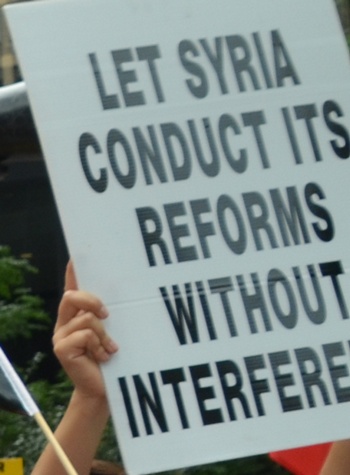 In the frequently cited
videos Islam posted to social
media,
he openly called for more foreign intervention in Syria and
reiterated talking points that have for years been echoed by
supporters of regime change.
In the frequently cited
videos Islam posted to social
media,
he openly called for more foreign intervention in Syria and
reiterated talking points that have for years been echoed by
supporters of regime change.
"We urge you to put pressure on your government, put pressure on anyone, to help us," Islam said. "I'm trying to make awareness so that people will support us and support our work and give us the equipment we need to continue saving lives."
Islam also claimed the alleged chemical attack is one of a string of such incidents, insisting, "These gas attacks are continuing every day and no one is doing anything to stop these gas attacks."
He tried to frighten civilians in the West claiming, "Now it's the civilian population of Syria; soon it would be the civilian population of America, in a subway or something." In reality, experts recognize that Syria's al-Qaeda affiliate Jabhat al-Nusra, the most powerful force among the rebels in the country (in its rebranded forms), poses the actual threat to civilians in the West, not the Syrian government.
Islam's claims have not been independently verified, and he said in a video that because of safety concerns he was not able to share his location.
Major news networks have demonstrated a similar lack of skepticism when it comes to reporting on other issues about Syria. Ambiguous "activists" and rebel groups committed to overthrowing the Syrian government, some of them linked to al-Qaeda, are often cited as sources in media reports.
The Syrian Observatory for Human Rights is a leading source, and is frequently described by media outlets as a "monitoring group." Yet even the New York Times, which often draws from SOHR's claims, has acknowledged that it "is virtually a one-man band" run out of the home of a man in a small town in England who has not been to Syria in more than a decade.
Likewise,
major
news
networks
like
CNN
have
repeatedly
cited
Bilal
Abdul
Kareem,
a
propagandist
for
extremist
jihadists militias in Syria who has
embedded himself with al-Qaeda's Syrian franchise, as a supposed
independent observer of the war.
Ben Norton is a
journalist and writer based in New
York City. He writes for AlterNet,
Mondoweiss, The
Intercept, Fairness
and Accuracy in
Reporting and Salon.
(AlterNet, April 6, 2017)
Website: www.cpcml.ca Email: editor@cpcml.ca
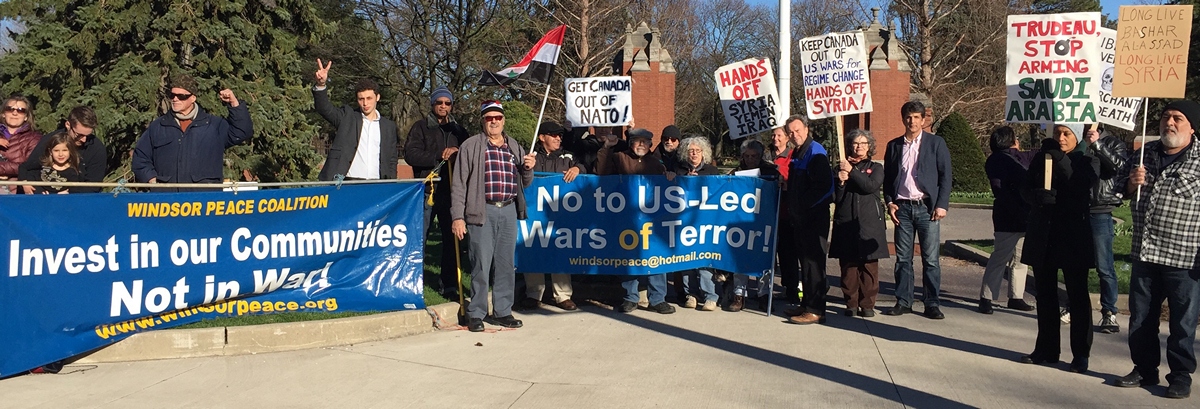
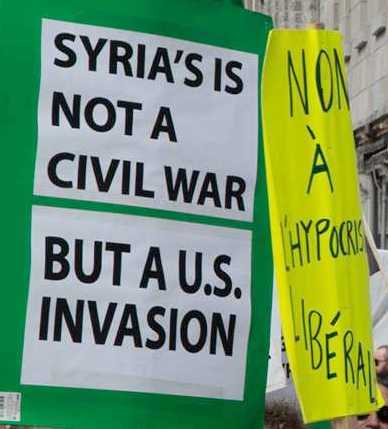 U.S. imperialist president
Donald Trump used the pretext of deaths due to the April 4 use of
chemical weapons on civilians, which he blamed on Syrian President
Bashar Al Assad, to launch the attack. It is reported that the chemical
weapons belonged to forces in the pay of the Anglo-American
imperialists and were released when the Syrian armed forces bombed what
they thought was an arms depot of the terrorists -- an airstrike
the Russians had already informed the Americans would take place. It is
increasingly evident that the chemical weapons were used by terrorist
groups as part of a deliberate provocation to blame the Syrian
President. Without waiting for an investigation on who used the
chemical weapons, the Trump administration declared the Syrian
government guilty and targeted the airfield from which the Syrians
launched their attack on the arms depot.
U.S. imperialist president
Donald Trump used the pretext of deaths due to the April 4 use of
chemical weapons on civilians, which he blamed on Syrian President
Bashar Al Assad, to launch the attack. It is reported that the chemical
weapons belonged to forces in the pay of the Anglo-American
imperialists and were released when the Syrian armed forces bombed what
they thought was an arms depot of the terrorists -- an airstrike
the Russians had already informed the Americans would take place. It is
increasingly evident that the chemical weapons were used by terrorist
groups as part of a deliberate provocation to blame the Syrian
President. Without waiting for an investigation on who used the
chemical weapons, the Trump administration declared the Syrian
government guilty and targeted the airfield from which the Syrians
launched their attack on the arms depot.

 Idlib is among the last
significant areas in Syria held by so-called rebel groups. When Aleppo,
some 60 kilometres away, was liberated in December, foreign-sponsored
armed groups, affiliated organizations such as the White Helmets and a
small number of civilians were evacuated to Idlib. Control of Idlib as
well as Khan Sheikhun, where the April 4 attack took place, is held
mostly by the Al-Nusra Front, an Al-Qaeda affiliated group that has
gone by various names including the latest, Tahrir al-Sham. Al Nusra is
accused of having used chemical weapons in the past; its members have
been arrested in Turkey for sarin gas possession and they left behind
in Aleppo a facility used for chlorine gas production, found after the
city was liberated.[
Idlib is among the last
significant areas in Syria held by so-called rebel groups. When Aleppo,
some 60 kilometres away, was liberated in December, foreign-sponsored
armed groups, affiliated organizations such as the White Helmets and a
small number of civilians were evacuated to Idlib. Control of Idlib as
well as Khan Sheikhun, where the April 4 attack took place, is held
mostly by the Al-Nusra Front, an Al-Qaeda affiliated group that has
gone by various names including the latest, Tahrir al-Sham. Al Nusra is
accused of having used chemical weapons in the past; its members have
been arrested in Turkey for sarin gas possession and they left behind
in Aleppo a facility used for chlorine gas production, found after the
city was liberated.[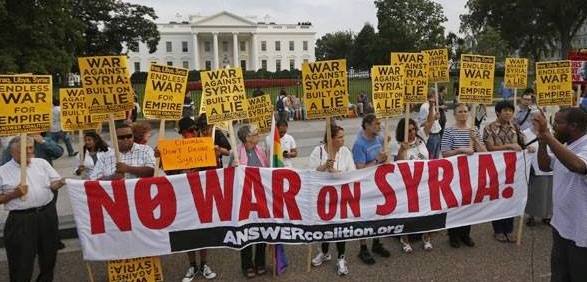

 In the House of Commons on
April 7, Prime Minister Trudeau
confirmed that Canada was given advanced warning of the strike
via a briefing from U.S. Secretary of Defense James Mattis to
Minister of Defence Harjit Sajjan, who then informed the Prime
Minister. Trudeau stated that he spoke with U.S. President Trump the
morning of April 7 and voiced his support for the strike. The Prime
Minister said in the House, "In the face of such heinous war crimes,
all civilized peoples must speak with one voice."
In the House of Commons on
April 7, Prime Minister Trudeau
confirmed that Canada was given advanced warning of the strike
via a briefing from U.S. Secretary of Defense James Mattis to
Minister of Defence Harjit Sajjan, who then informed the Prime
Minister. Trudeau stated that he spoke with U.S. President Trump the
morning of April 7 and voiced his support for the strike. The Prime
Minister said in the House, "In the face of such heinous war crimes,
all civilized peoples must speak with one voice."